Ten years on from the credit crunch, the financial headlines are as stark as ever. "Are we safe from a repeat?" "Where do investors go next?" "It’s about survival, not spending."
Scary stuff, don’t you think?
This summer marks a decade since the events that lead to a global financial meltdown began to unfold. Ten years later, we're still paying the price. Let's leave aside the political fallout, which has been debated to death, and instead cast our minds back 10 summers ago.
Do you remember what you were doing on the August 9th 2007? It’s certainly a date etched into the minds of finance professionals and politicians.
It was the first day of the holidays for Bank of England governor Mervyn King - and his last. That day, French bank BNP Paribas froze withdrawals from three mortgage-linked funds. King hurried back to work and didn’t have another holiday for a long time. The following month saw the first run on a UK bank in 140 years. The head of that bank, Northern Rock, would later describe August 9th as "the day the world changed."
_________________
Read more from Nima Abu Wardah:
[ How to create the ultimate lazy person's portfolio ]
[ Could you live without spending for a year? ]
[ Never be afraid to take risks in life but make sure you do it with a buffer in place ]
_________________
The issue that came up time and time again throughout the crisis remains imperative to know today: how does a bank make its money, and how does it manage its balance sheet.
The key is to know where an institution's vulnerability lies, who is exposed, and by how much. These were basic questions that couldn't be answered ten summers ago.
That lack of knowledge turned an asset bubble deflating into a seismic financial tsunami.
Have the banks learned their lessons? This is what Mervyn King has said:
“In the end the big story, when you look back 10 years, is none of [what the Bank of England did to fix the Northern Rock crisis] made any difference at all to the ultimate outcome of what was wrong with the banking system."
“Whatever we did made no difference to the fact that in the autumn of 2008 the entire banking system failed. Although Northern Rock was a great story in the UK it was little more than a bubble on the boiling sea of the failure of the banking system crisis in 2008.”
Worrying words.
Regulation on steroids was one answer, in the form of legislation such as the Dodd–Frank Wall Street Reform and Consumer Protection Act, signed into law in 2010. But such regulations dealt with the problems of a decade ago. What we don’t know, and what we’re not mitigating against, is the risk that lies ahead. Needless to say, it’ll be something new and unexpected, and we may well find ourselves unprepared and unprotected.
Our eye is all too often on the past and not the future. I think this is what John Bruton, the former prime minister of Ireland, and twice the country's minister of finance, wanted to get across when speaking at the Middle East Banking Forum a few years ago, in his capacity as chairman of International Financial Services Centre Ireland.
Holding up a huge wad of papers, he asked how many present had read the financial regulations of the day. Needless to say, no one in the room had. His point was that the answer does not lie in the over-regulation detailed in the pages he held up. The horse has already bolted long after we closed the stable door.
But being human, we went on to usher in a new era of financial regulation and monetary policy that continues to affect everything from banking revenues, compensation and staff numbers to fund manager performance, pension deficits and the life cycles of private equity funds.
Yes, things have changed since that date in August. But it doesn’t mean your money is safe.
We’re living with the political fallout. Here’s some of the investment fallout.
In terms of cash, interest rates are now at historic lows. It's great for those taking out a mortgage, but it hurts consumers. When you put 100 dirhams into a bank, what interest are you paid? How much do the goods you want cost? You find yourself in deficit territory; what you pay for goods goes up, what you get in interest on your deposit goes down.
The investment climate is such that if you manage to hold onto what you have, you’re doing well.
But for investors out there with cash, there will be opportunity. Global debt now stands at an all-time high of 325 per cent of gross domestic product (GDP). Something’s bound to give.
I have heard some joke about stashing cash under a mattress, and I can understand the appeal. Yes, it’d be worth less with time, but at least you’d still have it.
There was another headline that stood out – referring to the biggest winners – from an article looking at bonds and equities. Personally I think the biggest winner is the person who has stashed away cash reserves in a way that they weren’t before, even in this era of low interest. It puts you in a better position to deal with any downturn – and cash means opportunity for you when it dries up for others.
So what if banks go bust again? What are you doing to mitigate the risk of losing savings. Someone I know has distributed his money across 12 banks. His logic is that they can't all go bust, and that there's a savers deposit guarantee that comes with each.
We all have personal stories, and woes, from the credit crunch that began ten years ago. What’s yours? And, more importantly, what have you learned from it?





